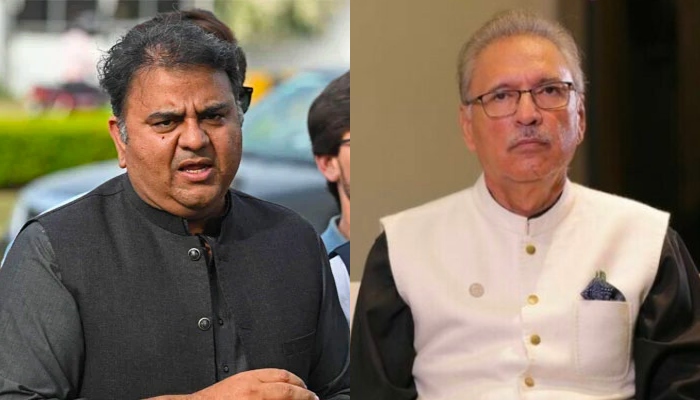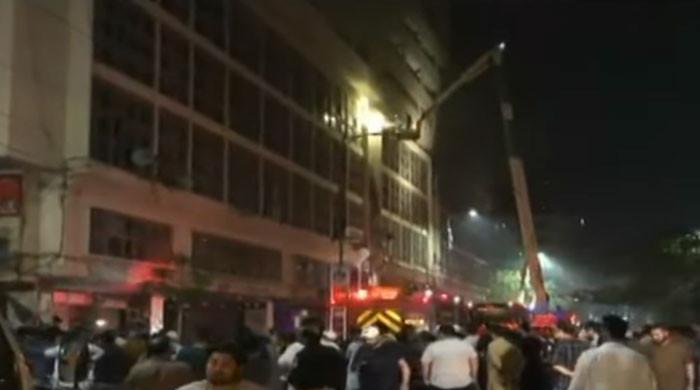‘Caretaker govts not legal after 90 days’: Fawad pens letter to President Alvi
PTI leader asks president to refer interim govt's matter to Supreme Court under advisory jurisdiction
April 16, 2023

- "After 90 days, interim govt can't be called legal," Fawad says.
- Adds caretaker setups indulged in taking major policy decisions.
- Asks president to refer their matter to SC under advisory jurisdiction.
As the constitutional terms of caretaker governments in Punjab and Khyber Pakhtunkhwa (KP) inch towards completion, Pakistan Tehreek-e-Insaf (PTI) Senior Vice-President Fawad Chaudhry Sunday asked President Arif Alvi to approach the Supreme Court under advisory jurisdiction.
The PTI leader has asked the president to refer the matter of the interim government's term completion to the country's top court, adding that they have been involved in making major policy decisions to affect the conduct of polls in the two provinces which have been ordered by the apex court.
On April 4, the apex court declared the Election Commission of Pakistan's (ECP) decision to hold polls in Punjab and Khyber Pakhtunkhwa (KP) on October 8 as "unconstitutional" and void, and ordered to conduct the elections in Punjab on May 14.
"After the lapse of 90 days, caretaker governments cannot be called legal in any way," the politician wrote in his letter, terming their presence a "breach of mandatory constitutional commands by the federal government and the Election Commission of Pakistan."
In his letter, Fawad wrote that interim governments — which can be considered an extension of the electoral body — are introduced for a limited time period of 90 days and are responsible for ensuring fair and transparent elections under Article 224 of the Constitution.
He added that their only objective is to facilitate the ECP in holding free, fair, just and honest elections in accordance with the Constitution and law. "Therefore, they are vested with only authority and power to run day-to-day affairs and not to take major policy decisions."
Meanwhile, the PTI leader added, interim setups were established in both provinces after the dissolution of the provincial assemblies. But the incumbent interim governments, against the laws and standards set for them, have indulged in taking major policy decisions including posting and transfers of the officials to affect the transparency and fairness of the elections.
The PTI had dissolved the Punjab and KP assemblies on January 14 and 18, respectively, in a bid to force the ruling coalition to hold early general elections.
The former information minister further stated that the interim setups in both provinces have completed their constitutional time period and since the constitution does not provide for continuation/extension of the period fixed for the interim setups, their present existence cannot be termed "lawful and they must be considered 'usurpers' imposed by the Election Commission and they are liable to be removed forthwith".
"In this eventuality, it is respectfully requested to kindly refer the matter to the Honourable Supreme Court of Pakistan in advisory jurisdiction to address this blatant unconstitutionality," the letter read.
It added that the mandatory time period for holding the elections within the stipulated time lapsed due to the "unconstitutional and illegal actions of the ECP and the PDM government in Islamabad".
Earlier today, Interior Minister Rana Sanaullah asserted that elections to the Punjab Assembly would not be held on May 14 despite the "all-out efforts" of the opposition PTI.
Elections across the country would be held at the appointed time this year, he said while talking to the media in Faisalabad.
Calling former prime minister Imran Khan a "fitna" (chaos), Sanaullah said that he had been brought to power through a "conspiracy". "Their [PTI's] policies over four years created a crisis situation for the country."
Sanaullah said Khan used to claim that he would prefer to die by suicide instead of approaching the International Monetary Fund (IMF). "It was [Imran Khan's] government that signed the agreement with the IMF, not us. The difficulties are only due to the previous government's agreement."











